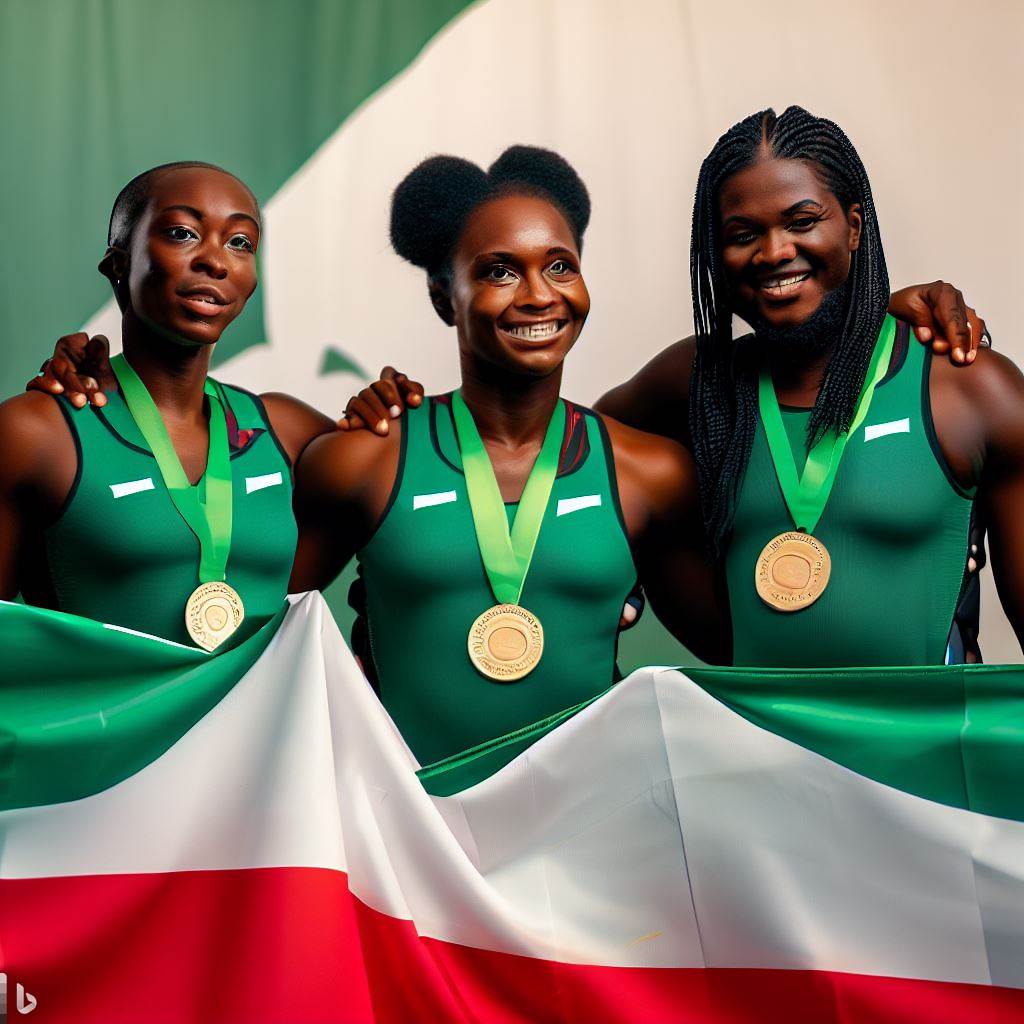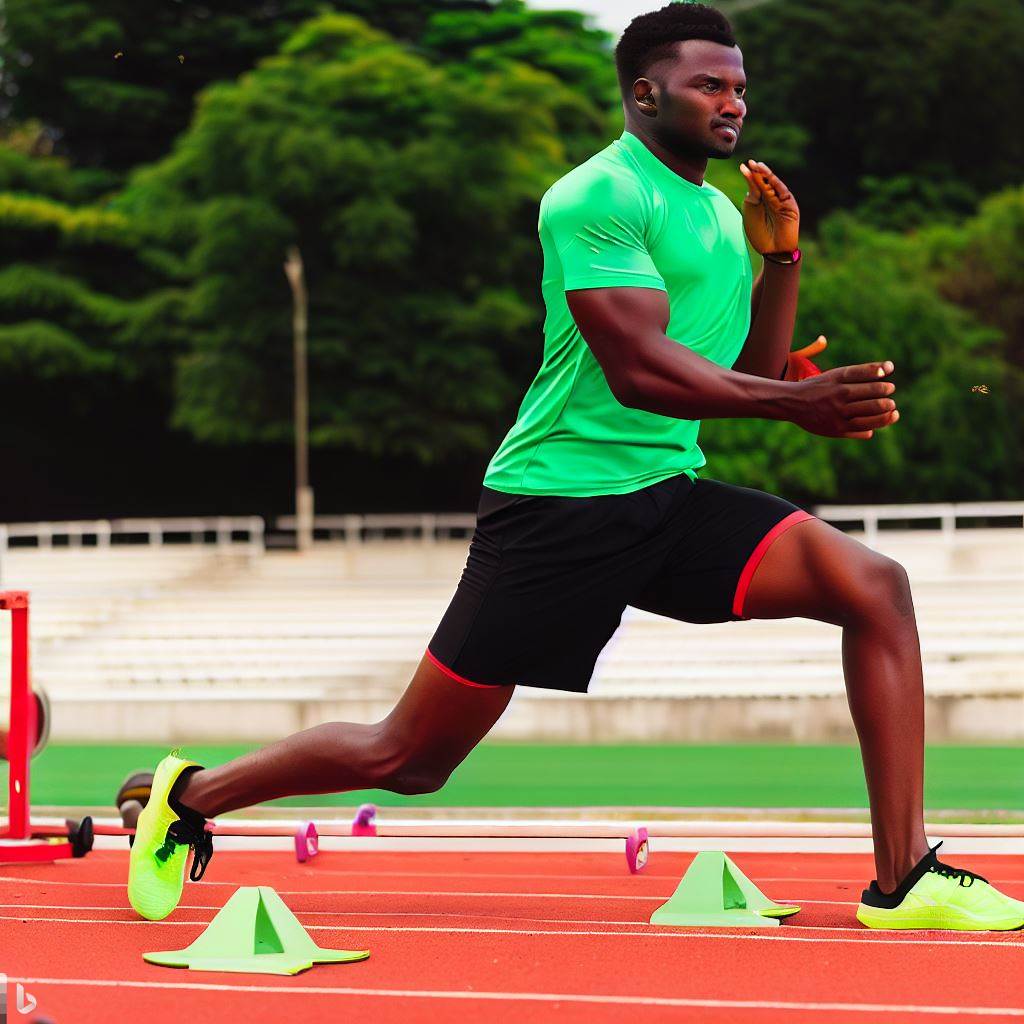Introduction
Sponsorship is a common practice in sports where companies pay to associate themselves with athletes. It’s an essential aspect of sports marketing as it creates a mutually beneficial relationship between athletes and sponsors.
Sponsorship provides athletes with the necessary funds to compete at the highest level, while sponsors get exposure for their brand.
In this blog post, we aim to explore the influence of sponsorship on Nigerian athletes. We’ll examine the benefits of sponsorship for athletes, the impact of sponsorship on performance, and the role of sponsorship in developing sports in Nigeria.
Brief History of Nigerian Athletes and Sponsorship
Nigeria is a country known for producing world-class athletes in various sports. From football to athletics, Nigerians have stamped their mark on the world stage.
However, these athletes have not always had the necessary support to aid their success. This blog chapter will take a historical look at sponsorship in Nigerian athletics, the notable athletes, and the importance of sponsorship in their success.
Read: Exploring Sports Medicine Opportunities in Nigeria
Overview of Notable Nigerian Athletes
Nigeria has produced several athletes who have made significant strides in their respective sports.
In athletics, the likes of Mary Onyali, Chioma Ajunwa, and Blessing Okagbare have won medals at major international competitions such as the Olympics and World Championships.
In football, the likes of Nwankwo Kanu, Jay-Jay Okocha, and John Mikel Obi have had successful careers at both the club and international levels.
Historical Summary of Sponsors of Nigerian Athletes
Prior to the 1990s, most Nigerian athletes did not have financial support from sponsors. Most of them had to rely on government funding or personal funds to finance their athletic pursuits.
However, this changed in the 90s as corporate companies started investing in sports sponsorship. Companies like Nigerian Breweries, Coca-Cola, and MTN became sponsors of Nigerian athletes and sports teams.
In football, global brands like Nike and Adidas sponsor the Nigerian national team, while local brands like Globacom and Bet9ja sponsor Nigerian football clubs.
Importance of Sponsorship in the Success of Nigerian Athletes
Sponsorship plays a crucial role in the success of Nigerian athletes. Financial support helps athletes cover training and competition expenses, travel costs, equipment, and coaching fees.
Without sponsorship, athletes may struggle to reach their full potential and compete at the highest level. Sponsors also offer exposure for athletes through advertising campaigns, which can lead to more support and opportunities.
Moreover, sponsorship helps in the development of sports in Nigeria. This is because corporate sponsors inject funds into sports infrastructure, coaching, and talent development. With more investment, sports facilities can be built or improved, and athletes can receive better training and development programs.
In essence, sponsorship has played a significant role in the success of Nigerian athletes. From the early days of government funding to corporate sponsorship, athletes have relied on external funding to compete at the highest level.
With more investment in sponsorship, Nigerian athletes can continue to excel in various sports and inspire younger generations to do the same.
Read: A Close Look at the Nigerian Professional Sports Infrastructure
Types of Sponsorship for Nigerian Athletes
Sponsorship is an essential aspect of sports, and Nigerian athletes are not left out. It is through sponsorship that athletes get the necessary financial support to attend events, buy equipment, and maintain a healthy lifestyle.
In Nigeria, there are different types of sponsorship available for athletes, which include:
Personal Sponsorship
Personal sponsorship is sponsorship given by individuals either as support or investment in an athlete’s career. This type of sponsorship can come from family, friends, or well-wishers with the financial capability to support the athlete.
Personal sponsorship can also involve endorsement deals where companies pay an athlete to promote their brand. Some Nigerian athletes have benefited significantly from personal sponsorship, which contributed to their success in their respective sports.
Team Sponsorship
Team sponsorship is when a group collectively sponsors a team or group of athletes. In Nigeria, most team sponsorship comes from sports clubs, associations, and federations.
The sponsorship usually covers the team’s expenses, such as uniforms, equipment, and competition fees. The benefits of team sponsorship extend beyond the financial aspect, as athletes have the opportunity to train and compete with other athletes in the same discipline.
Sponsorship from Corporate Bodies
Corporate bodies are significant sponsors of Nigerian athletes. This can be through partnership deals, where companies sponsor sports events and provide financial support to athletes.
In recent times, there has been an increase in sponsorships from corporate bodies in Nigeria. For instance, some telecom companies have partnered with sporting associations to support athletes by providing equipment, training facilities, and financial support.
This type of sponsorship has had a positive impact on athletes’ careers, as it contributes to their success in sports.
Government Sponsorship
The Nigerian government also plays a significant role in sponsoring athletes. The government’s sponsorship can come in the form of grants, scholarships, and financial support to athletes and sports associations.
Government involvement in sports has brought about the development of sports infrastructure such as sports facilities, stadiums, and equipment.
The Nigerian government’s investment in sports has encouraged young athletes to take up sports as a career, and many have gone on to become successful on the international stage.
Scholarships and Grants
Scholarships can be awarded to athletes by academic institutions to encourage them to pursue sports while still getting an education.
Grants, on the other hand, are financial aids given to athletes to support their training and competition in sports. Both scholarships and grants help athletes to focus on their sporting careers without worrying about financial challenges.
In addition, the different types of sponsorship available for Nigerian athletes have had a significant impact on their careers, with many athletes attaining success in their respective sports.
The government, corporate bodies, and individuals need to continue to support Nigerian athletes financially to foster the growth and development of sports in Nigeria.
Read: Steps to Building a Career in Nigeria’s Sports Field
The Positive Impact of Sponsorship on Nigerian Athletes
The role of sponsorships in the development of athletes cannot be overemphasized as it has proved to be a major driving force in the success of Nigerian athletes. Here are a few of its positive impacts:
Provision of necessary equipment and training facilities
Sponsorships have played a major role in providing Nigerian athletes with the necessary equipment and training facilities needed to excel in their respective sports.
With the help of sponsors, athletes have access to state-of-the-art equipment and training facilities that allow them to train and compete at the highest level.
Exposure to world-class training and competitions
Sponsorships have also exposed Nigerian athletes to world-class training and competitions. With the help of sponsors, athletes have the opportunity to travel abroad to train with top-notch coaches and compete in international competitions.
This exposure helps to improve their skills, experience, and confidence on a global scale.
Financial support for athletes’ livelihoods
Sponsorships provide Nigerian athletes with much-needed financial support for their livelihood. Athletes can use these funds to pay for their basic needs, such as housing, food, and medical expenses.
This financial support also allows athletes to focus solely on their training and competing without worrying about their financial situation, which can be a major distraction.
Boost to the athlete’s career and national pride
Sponsorships also provide a significant boost to the career of Nigerian athletes. With the help of sponsors, athletes can gain more exposure to the public and media, which can help to attract even more sponsorship interest.
Additionally, successful athletes are a source of national pride and bring positive publicity to their country. This can lead to more investment in sports development and can also inspire a new generation of athletes.
Sponsorship has also had a positive impact on Nigerian athletes’ development and success.
It provides them with the necessary equipment and training facilities they need to compete on a global scale, exposure to world-class training and competitions, financial support for their livelihoods, and a boost to their career and national pride.
It is, therefore, important that more support is given to athletes through sponsorships in order to continue to build and improve the Nigerian sports industry.

The Negative Impact of Sponsorship on Nigerian Athletes
Dependency on sponsors
Athletes who rely solely on sponsorships for their careers have a high chance of becoming dependent on their sponsors.
This dependence can lead to the athletes feeling powerless and the sponsors taking advantage of them.
Pressure to perform to maintain the sponsor’s interest
Sponsors are investing in athletes with the expectation of a return on investment. Therefore, Nigerian athletes under sponsorship agreements are under pressure to perform and meet the sponsor’s expectations.
This can lead to athletes compromising their health, training excessively, and taking performance-enhancing drugs.
Consequences of sponsorship withdrawal
Withdrawal of sponsorship can be devastating for Nigerian athletes who have relied heavily on those sponsorships for their career success.
A sponsorship withdrawal can lead to the termination of an athlete’s career and the loss of financial support. This can take a toll on the athlete’s mental health.
Emotional and psychological instability
The relationship between sponsors and athletes is built on trust and mutual benefit.
However, this relationship can lead to emotional and psychological instability for Nigerian athletes.
Athletes can feel like they are constantly being monitored and judged based on their performance. This can cause anxiety, depression, and other mental health issues.
The Bottom Line
While sponsorship can bring significant benefits to Nigerian athletes, it is essential not to rely solely on them. Athletes must prioritize their mental and physical health and remain true to their values while working with sponsors.
Organizations can help Nigerian athletes by establishing policies and enforcing standards that prioritize athlete health and well-being. This will enable Nigerian athletes to continue performing at their best while still meeting their sponsors’ goals.
Read: Nigeria’s Athletics Professions: Potential and Pitfalls
Conclusion
After discussing the various ways that sponsorship impacts Nigerian athletes, it is clear that the benefits are numerous.
Sponsorship provides athletes with opportunities that they may not have otherwise had, such as travel, training, and equipment.
It also allows them to focus on their sport without worrying about day-to-day expenses that could hinder their performance.
However, there are also challenges associated with sponsorship, including the potential for exploitation by sponsors who are only interested in profiting off of athletes.
This is especially true in Nigeria, where the government and corporate bodies have not invested enough in sports to support athletes without the help of sponsorships.
Recommendations for Sponsors
To address these challenges, it’s time for the Nigerian government and corporate bodies to take a more active role in supporting athletes.
This includes investing in sports infrastructure and providing financial support to athletes who are not able to secure sponsorships on their own.
It also means ensuring that sponsors are held accountable for the way they treat athletes and providing oversight to ensure that athletes are not being exploited.
For sponsors, there are several ways to provide a balance between benefiting from the investment and ensuring that athletes are not exploited.
One of these is to create contracts that are fair to both parties, providing athletes with adequate compensation and benefits while also allowing sponsors to benefit from their investment.
Sponsors should also work closely with athletes and their coaches to ensure that their needs are being met and that they are able to focus on their sport without distraction.
Overall, the influence of sponsorship on Nigerian athletes is significant.
While there are challenges associated with sponsorship, including the potential for exploitation, the benefits are numerous.
To ensure that athletes are not being exploited, it’s time for the Nigerian government and corporate bodies to invest more in sports and provide oversight to ensure that athletes are not being taken advantage of.
For sponsors, it’s important to provide a balance between benefiting from their investment and ensuring that athletes are being fairly compensated and supported.




